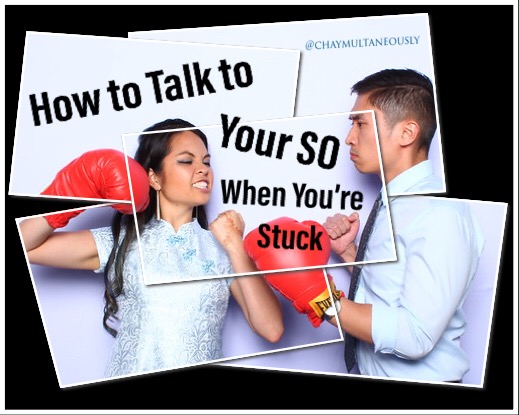Why We Cheat (and Get Cheated On)
I realized after I wrote "Post-Traumatic Cheating Disorder" that I could go so much more in depth about what cheating is and why it happens.. and usually when I research for these posts, I don't find something very comprehensive, but I actually found a great article here that gave me even more insight... so here goes, cheating pt. 2!
When I was a teenager, I remember clearly thinking to myself: "Cheating is disgusting! How could anyone ever do that to someone else, especially someone they said they loved? People deserve the worst punishment for cheating." Now that I'm older and wiser (supposedly), I have a slightly more complex view of the matter, especially since I've seen it from pretty much every angle there is, through friends and personal experience--something really difficult to admit for anyone.
 |
| thanks Charlie Brown |
The definition of cheating or an affair that I'm using is: a romantic relationship in which at least one person is committed to someone else (or something else, if the person is supposed to be celibate). Like I've said before, because we are humans living with fluid categories, we can experience an affair outside of romance with another person (for example, feeling "cheated on" when an SO has been actually overly engaged with work for his job), but for this post I'm focusing on relationships complicated by other people.
Boiled down to the very basics, cheating stems from an insecurity of identity. If you're not sure who you are / what you want from life, it's very easy to blur the lines between what you say you are and who you are, leaving room for all sorts of things to grow in the margins.
Let's take a look at the elements of an affair to make this clearer:
This is the person connecting the triangle together. They are committed to one person in some capacity, whether marriage or monogamous dating, and they are also spending more than their fair share of their time and energy with someone outside of that commitment. They are in limbo; they feel some kind of fulfillment in their committed relationship, which is why they didn't make the choice to leave; at the same time, there is something missing - usually in their own life and identity - that they haven't shared with their partner.
There can be all sorts of reasons not to leave: "My partner is the reason I came out to my family," or "My boyfriend sees the best in me, and if I let them go, it means I don't believe in myself" or "My wife is the reason I was able to make positive changes in my life," or "My girlfriend is always there for me," or "My husband makes me feel stable and safe," the list can go on and on forever - but in every scenario, there is something about your commitment that also means something about who you are, and what you would become if you let them go. And that's a pretty frightening thing for anyone to really face head on.
This is the person (typically) unaware of the affair and believing that everything is okay - though many instances that I've seen, the person can sense that something is not quite right and it comes out in subversive ways. The truth has a funny way of being present, even when it has never been stated. For example, little things that the "locus" person does might become incredibly annoying, or you'll get into fights about anything small that has to do with dishonesty.
Often, the committed person also has some part in having an insecure identity as well. To be very clear: it is not okay to be cheated on-- I am not saying that anyone deserves it, and yes, it is not always black and white, so it can take awhile to realize what is even happening. What I am saying is, mutual relationships are people leaning on each other to go forward in the direction they choose; if someone is leaning away from you, you can feel it when you're strongly attached to them. And if that isn't addressed, then part of the committed person learns to tolerate that feeling of their partner not quite being there.. instead of holding their partner to the commitment.
Well, there's only one other person left: the person on the sidelines. It can be a simultaneously exciting and also painfully lonely place to be, especially if that person is aware of the entire situation. (If they aren't aware of it, then their experience is pretty much identical to the committed person, because they think that it's exclusive.) The outsider's identity insecurity is unique in its reasoning for how this is somehow okay.
While the "locus" is torn between their commitment vs. the "new" part of their identity they have in an affair (or conversely, an old part of their identity if they are still hung up on an ex), the outsider is a mirror of this from the other side: simultaneously insecure about their self-worth and also climbing their way to believing they deserve more than they previously accepted for themselves. From this perspective, it's easier to see how justifiable the "It's-Not-Really-An-Affair" can be. When someone is cheating "for" you (because really, 9 times out of 10 they're not), it can be skewed as a twisted boost to your ego. What's more flattering than someone cheating on their commitment for you?
(Oh wait, yes, them actually being a healthy and responsible adult and taking care of business first.. not as flashy, but way more attractive in the long run.)
 |
| talk emotionally stable to me baby |
To summarize:
> Burying your affair or isolating it from the rest of your life are both mistakes; as I mentioned before, what is unfinished will always come back to haunt you.
1. Acknowledge that there is a reason for an affair.
2. Prioritize those immediately impacted by the consequences (if there are kids = priority one, then of course those within the triangle.)
3. Use that knowledge to grow from it, whether it means letting go -- of your committed relationship or re-committing and actually strengthening your relationship (and yes, letting go of your side bae).
*If you are side bae, or the committed bae, you have a very focused role: ask yourself what you need to establish trust in yourself FIRST. Not in the cheater - not in his/her/their side bae - but in You. The hardest part for anyone to deal with when you lose trust in someone else is actually feeling like you've harmed yourself.. how you learn to trust yourself will determine your future steps.
This will inform you whether you will be better off with the person you were in a relationship with and repairing the relationship or moving on.
That's all for now folks!














Comments
Post a Comment